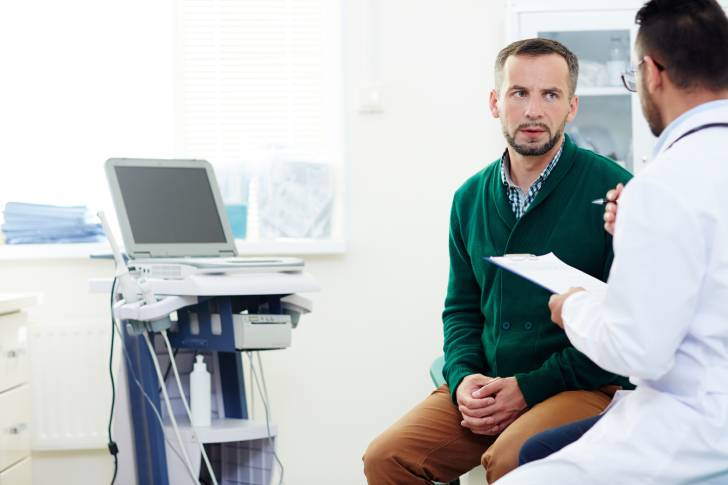This is the disease that most threatens the health of men in old age, namely prostate cancer. But you can avoid it from now on, with the ways that we will share on this page. So make sure you read it to the end, okay?
People who have prostate cancer have a certain type of cancer in their prostate. There aren't a lot of prostate that grow very quickly. They may spread to other parts of the body, like the bones and lymph nodes. It is better for people who have a long life expectancy to have tests done. Prostate is the second most common cancer in the world, and it is also the most common in men.
Prostate Cancer Issues For Men
One million people had it, and 359,000 died. It can be very dangerous for men who have prostate cancer. Most don't die from it, but it can be very bad for them
Key Signs Of Prostate
If so, what are the main signs of prostate cancer? Knowing the symptoms will help you to make early detection. You can see the symptoms of prostate when:
- Urinate more often.
- Get up at night to empty your bladder.
- Having difficulty urinating such as a weaker stream of urine, or straining when starting to empty the bladder.
- There is blood in your urine or semen.
- Pain or burning urination.
- Painful ejaculation.
- Frequent pain or stiffness in lower back, hips, pelvic or rectal area, or upper thighs.
Most prostate cancers are found early, through screening. However, early prostate cancer usually causes no symptoms, so you need to be careful and alert. It would be better if you occasionally see a doctor.
What Is The Main Cause Of Prostate?
Scientists don't know what causes this cancer, but they have discovered some things that can make you more likely to get it too. DNA is the chemical that makes up our genes, which tell us how our cells are supposed to work. As a person grows up, they can learn about how their DNA changes from their parents. There are three types of DNA mismatch repair genes: MSH2, MSH6, and MLH1. Mutations in this gene have been linked to prostate cancer that starts before it's ready.
Most gene mutations are not passed from father to son. They occur during a man's life, not through his genes. Those who have a lot of insulin-like growth factor-1 (IGF-1) are more likely to develop prostate cancer. There are several studies that have found an association between IGF-1 and prostate inflammation.
However, prostate cancer is caused by changes in the DNA of normal prostate cells. We have DNA in our cells, which is the chemical that makes up our genes, which is the instructions for how our cells work. Because our parents are the source of our DNA, we tend to be very similar to them. But our DNA affects more than just our appearance.
It's Important To Check Your Prostate
The goal of screening for prostate cancer is to find cancer that may spread if left untreated, and to find it early so it can be treated. Preventing prostate with screening can help you find it before it gets too severe.
Examination with a digital rectal system is one of the prostate cancer screenings that can be performed by men (DRE). When your doctor does a DRE, he or she will insert a gloved, lubricated finger into your rectum to examine your prostate, which is next to it. Your doctor may need to do more tests if he or she finds an abnormality in the texture, shape, or size of the gland.
As we mentioned above, the purpose of prostate cancer screening is to identify tumors that may spread if not treated and to detect them early. Therefore, you really need to do this screening before it's too late.
Another method of screening is by the use of Prostate Specific Antigens (PSA). The prostate-specific antigen (PSA) test is a blood test that determines the level of PSA in the blood. PSA is a chemical produced by the prostate gland.
PSA levels in males with prostate cancer may be elevated. PSA levels may also be raised in other prostate-related disorders.
As a general rule, the higher the PSA level in the blood, the greater the likelihood of prostate problems. However, numerous variables, such as age and race, can affect PSA levels. Certain prostate glands produce significantly higher PSA than others.
Because a variety of factors can affect PSA levels, the best person to interpret your PSA test findings is your doctor. If your PSA test results are abnormal, your doctor may propose that you undergo a biopsy to determine whether you have prostate cancer.
Prostate Cancer Prevention
They have a greater chance of getting prostate cancer that has spread to other parts of their body or that is more likely to kill them if they are fat and/or obese, though.
Selenium and vitamins are good for your body, so you should take both of them to make sure you're getting enough. People who eat a lot of soy may be less likely to get prostate cancer because of a protein called isoflavones.
Some drugs are used to treat BPH. This is a growth of the prostate that isn't dangerous. High-grade prostate cancers are more likely to grow and spread, so they're more likely to do that.
If you take some drugs, they may have sexual side effects like decreased desire for sex and an inability to get good sex.
Unfortunately, these four factors are difficult or impossible to change, but there is much that men can do to reduce or delay their risk of developing prostate cancer. Some prostate prevention of them are as follows:
1. Consume more fish
Several studies show that fish can help protect against prostate cancer because they have "good fat," like omega-3 fatty acids. Try to avoid trans fats (for example, in margarine).
2. Consume fewer calories and increase your physical activity
People who eat a lot of fish may be less likely to get prostate cancer because they have a lot of "good fat," like omega-3 fatty acids. Try to avoid trans fats (found, for example, in margarine).
3. Take care with your calcium intake
Do not take extra doses that are much higher than the recommended daily amount. In general, you can have some calcium, but don't take more than 1,200 mg per day.
4. Smoking & drinking alcohol
Avoid smoking for various reasons, and drink alcohol in moderation or should be avoided.
5. It's time to let go and enjoy life
To live a longer, happier life, cut down on the stress in your job and at home.
6. Medical care is what you do to someone
Stress, high blood pressure, diabetes, high cholesterol, and depression should be checked out by a doctor. You may live if you treat these conditions. Treating them will help you have a better chance of living with prostate cancer.
7. Take care not to over-supplement your body
Megavitamins should not be taken in large doses. It's not likely that taking a multivitamin will hurt you. You probably don't need it if your diet is full of fruits and vegetables, whole grains, fish, and healthy oils. If you take herbal supplements, talk to your doctor about them. Some of them could hurt you or interfere with your treatment.
8. Prostate cancer should be checked out by a doctor
Talk to your doctor about the risks and benefits of getting a PSA test to check for prostate cancer in men over 45, or those who have a family history of it. Your doctor may also want to check your rectum.
9. Vegetables can be eaten
Use olive oil to cook ripe tomatoes and vegetables like broccoli and cauliflower in many of your meals each week. Soy-based foods and green tea could also be good food choices.
10. Keep the amount of fat
Eat less food and exercise more so that you stay at a healthy weight.
Many people who have advanced prostate cancer use hormone therapy to shrink the cancer and slow its growth, which can make the cancer less dangerous. Hormone therapy can sometimes be used before radiation therapy to treat prostate cancer that hasn't spread to other parts of the body. Radiation therapy works better when the cancer is smaller and when it is smaller. This helps.
It is possible to treat prostate cancer with a combination of different treatments. These could be surgery, radiation therapy, or hormone therapy. This includes the patient's cancer stage, treatment needs, risk level, life expectancy, health, overall health, and personal preferences. These factors will be taken into account when making a decision about treatment.
Often, when it comes to prostate cancer treatment, the right time is just as important as the type of treatment that is used. Some people choose to keep an eye on their health and not get treatment right away to avoid the risks and side effects that come with it.
Conclusion
In the world, prostate cancer is the second most common type of cancer. It is also the most common in men, and the most common in those who have it A lot of things can make you more likely to get prostate cancer. Scientists have found a few of them, but they don't know what causes it.
When you know the main signs of prostate cancer, you'll be able to find it early. One of the ways men can check for prostate cancer is to have a digital rectal examination. There is a test called Prostate Specific Antigens (PSA) that tells you how much PSA is in your blood.
Age and race can also affect PSA levels, as well as other things, like age and race. A biopsy could be done if your PSA test results aren't normal. This will help your doctor figure out if you have prostate cancer. People who eat a lot of soy may be less likely to get prostate cancer because isoflavones make them less likely. Avoid trans fats and eat more fish to keep your prostate healthy. It's important to see a doctor if you have stress, high blood pressure, high cholesterol or depression.
If you take care of them, they will help you have a better chance of living with prostate cancer, Getting a PSA test can be both good and bad. You should talk to your doctor about the risks and benefits.

.jpg)

